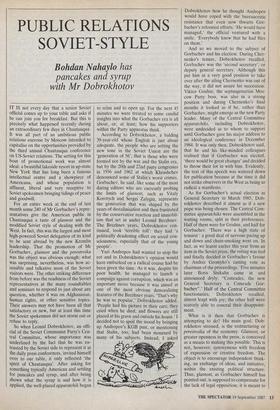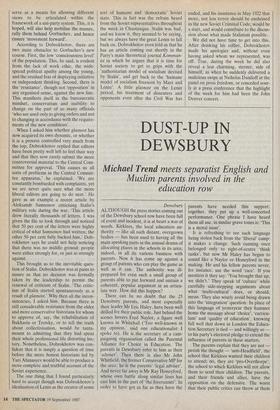PUBLIC RELATIONS SOVIET-STYLE
Bohdan Nahaylo has
pancakes and syrup with Mr Dobrokhotov
IT IS not every day that a senior Soviet official comes up to your table and asks if he can join you for breakfast. But this is precisely what happened recently during an extraordinary few days in Chautauqua. It was all part of an ambitious public relations exercise by Moscow intended to capitalise on the opportunities provided by the third annual Chautauqua conference on US-Soviet relations. The setting for this bout of promotional work was almost ideal: a beautiful lakeside resort in up-state New York that has long been a famous intellectual centre and a showpiece of Americana, and whose population is affluent, liberal and very receptive to Soviet spokesmen bringing tidings of peace and goodwill.
For an entire week at the end of last month some 240 of Mr Gorbachev's repre- sentatives give the American public in Chautauqua a taste of glasnost and the modified Soviet style of dealing with the West. In fact, this was the largest and most high-powered Soviet delegation of its kind to be sent abroad by the new Kremlin leadership. That the promotion of Mr Gorbachev, glasnost and the perestroika was the object was obvious enough; what was surprising, nevertheless, was how ac- cessible and talkative most of the Soviet visitors were. The other striking difference from before was the readiness of the Soviet representatives at the many roundtables and seminars to respond to just about any question, whether it was on Afghanistan, human rights, or other sensitive topics. Their answers may not have been all that satisfactory or new, but at least this time the Soviet spokesman did not storm out or refuse to reply.
So when Leonid Dobrokhotov, an offi- cial of the Soviet Communist Party's Cen- tral Committee, whose importance was underlined by the fact that he was en- trusted by the Soviet side to represent it at the daily press conferences, invited himself over to our table, it only reflected 'the spirit of Chautauqua'. After asking for something typically American and settling for pancakes and syrup, and after being shown what the syrup is and how it is applied, the well-placed apparatchik began
to relax and to open up. For the next 45 minutes we were treated to some candid insights into what the Gorbachev era is all about, or, at least, how his supporters within the Party apparatus think.
According to Dobrokhotov, a balding 39-year-old whose English is just about adequate, the people who are setting the new tone in the Soviet Union are the `generation of 56', that is those who were formed not by the war and the Stalin era, but by the 20th and 22nd party congresses in 1956 and 1962 at which Khrushchev denounced some of Stalin's worst crimes. Gorbachev, he said, like some of the most daring editors who are currently probing the limits of glasnost, such as Vitaly Korotych and Sergei Zalygin, represents the generation that was shaped by the years of destalinisation and then frustrated by the conservative reaction and immobil- ism that set in under Leonid Brezhnev. The Brezhnev years, Dobrokhotov con- tinued, took 'terrible toll': they had 'a politically deadening effect on social con- sciousness, especially that of the young people'.
Yuri Andropov had wanted to stop the rot and in Dobrokhotov's opinion would have embarked on a radical course had he been given the time. As it was, despite his poor health, he managed to launch a campaign against Corruption, which was an important move because it was aimed at one of the most obvious demoralising features of the Brezhnev years. 'That's why he was so popular,' Dobrokhotov added. `People had his picture in their cars; they cried when he died; and flowers are still placed at his grave and outside his house.' I decided not to spoil the mood by bringing up Andropov's KGB past, or mentioning that Stalin, too, had been mourned by many of his subjeCts. Instead, I asked Dobrokhotov how he thought Andropov would have coped with the bureaucratic resistance that even now thwarts Gor- bachev's reformist efforts. 'He would have managed,' the official ventured with a smile. 'Everybody knew that he had files on them.'
And so we moved to the subject of Gorbachev and his election. During Cher- nenko's tenure, Dobrokhotov recalled, Gorbachev was the 'second secretary', or deputy general secretary. Although this put him in a very good position to take over after the ailing Chernenko was out of the way, it did not assure his succession. Viktor Grishin, the septuagenarian Mos- cow Party boss, was also in a strong position and during Chernenko's final months it looked as if he, rather than Gorbachev, might emerge as the new Party leader. Many of the Central Committee apparatchiks, including Dobrokhotov, were undecided as to whom to support until Gorbachev gave his major address to an ideological conference in December 1984. It was only then, Dobrokhotov said, that he and his like-minded colleagues realised that if Gorbachev was elected, `there would be great changes' and decided to throw their lot in with him. Evidently, the text of this speech was watered down for publication because at the time it did not strike observers in the West as being so radical a manifesto.
As for Gorbachev's actual election as General Secretary in March 1985, Dob- rokhotov described it almost as if a new pope was being chosen. The Central Com- mittee apparatchiks were assembled in the waiting rooms, split in their preferences. Half of them were for Grishin, and half for Gorbachev. 'There was a high state of tension': a good deal of nervous pacing up and down and chain-smoking went on. In fact, as we learnt earlier this year from an item in the Soviet press, the voting was tied and finally decided in Gorbachev's favour by Andrei Gromyko's casting vote as chairman of the proceedings. 'Five minutes later Boris Stukalin came in and announced dryly: "Comrades, the new General Secretary is Comrade Gor- bachev".' Half of the Central Committee functionaries, Dobrokhotov recalled, almost leapt with joy; the other half were scarcely able to conceal their disappoint- ment.
What is it then that Gorbachev is attempting to do? His main goal, Dob- rokhotov stressed, is the restructuring or perestroika of the economy. Glasnost, or greater openness in the press, is conceived as a means to making this possible. This is not, however, synonymous with freedom of expression or creative freedom. The object is to encourage independent think- ing, an exchange of ideas, and initiative, within the existing political structure. Thus, glasnost, as Gorbachev himself has pointed out, is supposed to compensate for the lack of legal opposition; it is meant to
serve as a means for allowing different views to be articulated within the framework of a uni-party system. This, it is hoped, will also help mobilise the masses, rally them behind Gorbachev, and hence ensure 'movement forward'.
According to Dobrokhotov, there are two main obstacles to Gorbachev's new course. First, the low 'consciousness level' of the population. This, he said, is evident from the lack of work ethic, the wide- spread political apathy among the young, and the residual fear of displaying initiative or independent thinking. Second, there is the 'resistance', though not 'opposition' in any organised sense, against the new line. This manifests itself in the bureaucratic mindset, conservatism and inability to change on the part of so many officials `who are used only to giving orders and not to changing in accordance with the require- ments of the new conditions'.
When I asked him whether glasnost has now acquired its own dynamic, or whether it is a process controlled very much from the top, Dobrokhotov replied that editors have been pretty well left to feel their way and that they now rarely submit the more controversial material to the Central Com- mittee for approval. 'This causes us all sorts of problems in the Central Commit- tee apparatus,' he explained. 'We are constantly bombarded with complaints, yet we are never quite sure what the more liberal editors are going to do next.' He gave as an example a recent article by Aleksandr Samsonov criticising Stalin's military role during the war. 'This article drew literally thousands of letters. I was given the file to look through and noticed that 50 per cent of the letters were highly critical of what Samsonov had written; the other 50 per cent fully backed him,' Dob- rokhotov says he could not help noticing that there was no middle ground: people were either strongly for, or just as strongly against.
This brought us to the inevitable ques- tion of Stalin. Dobrokhotov was at pains to assure us that no decision was formally taken by the leadership to permit the renewal of criticism of Stalin. 'The critic- ism of Stalin started spontaneously as a result of glasnost.' Why then all the incon- sistencies, I asked him. Because there is still considerable resistance from the older and more conservative historians for whom to approve of, say, the rehabilitation of Bukharin or Trotsky, or to tell the truth about collectivisation, would be tanta- mount to admitting that they had spent their whole professional life distorting his- tory. Nonetheless, Dobrokhotov was con- fident that it is simply a question of time before the more honest historians led by Yuri Afanasyev would be able to produce a more complete and truthful account of the Soviet experience.
The one thing that I found particularly hard to accept though was Dobrokhotov's idealisation of Lenin as the creator of some
sort of humane and 'democratic' Soviet state. This in fact was the refrain heard from the Soviet representatives throughout the week in Chautauqua. Stalin was bad, and we know it, they seemed to be saying, but we always have the great Lenin to fall back on. Dobrokhotov even told us that he has an article coming out shortly in the Party's main theoretical journal Kommun- ist in which he argues that it is time for Soviet society to get to grips with the `authoritarian model of socialism devised by Stalin', and get back to the 'humane model of socialism foreseen by Marx and Lenin'. A little glasnost on the Lenin period, his treatment of dissenters and opponents even after the Civil War has
ended, and his insistence in May 1922 that more, not less terror should be enshrined in the new Soviet Criminal Code, would be a start, and would contribute to the discus- sion about what made Stalinism possible.
We did not have time to get into this. After drinking his coffee, Dobrokhotov made his apologies and, without even having asked whom we represented, was off. True, during the week he did also reveal a less charming, sterner, side of himself, as when he suddenly delivered a malicious swipe at Nicholas Daniloff at the panel on press freedom, or conceded sour- ly at a press conference that the highlight of the week for him had been the John Denver concert.



































































 Previous page
Previous page